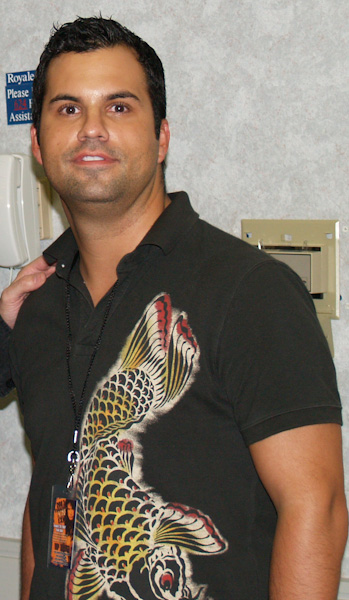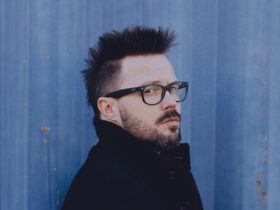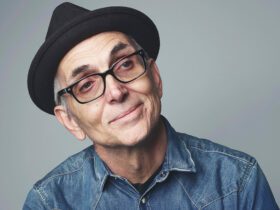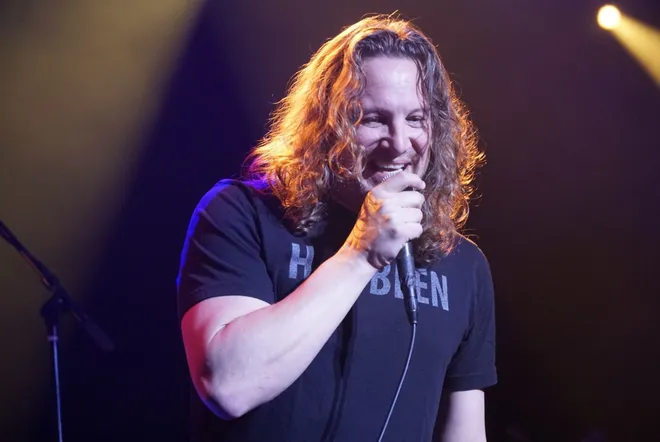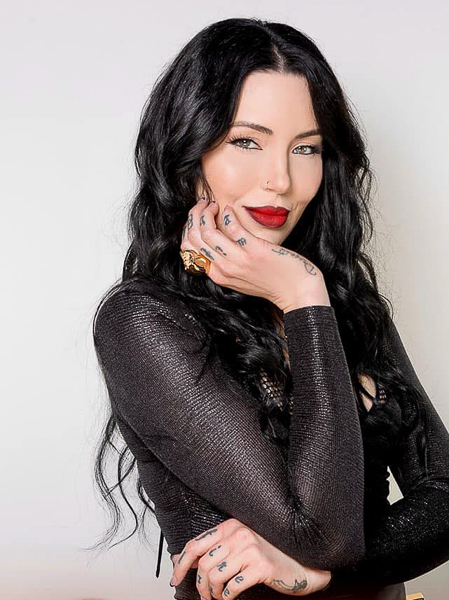Thomas Scott McKenzie has been passionate about guitars and rock and roll ever since he was a child. Stuck in a bit of a rut and not quite satisfied with his job, he decided to fulfill a lifelong fantasy and seek out the rockers that have always inspired him. His newest book, “Power Chord,” chronicles his journey of self-discovery as he meets up with some of his idols and begins to find the passion in his own life again. I had the chance to speak with Thomas and get some details on his unique life experience.
KE: Hi Thomas, Thank you for taking the time to speak with us this morning.
TSM: Thanks for having me. I appreciate the coverage.
KE: In the beginning of the book, you talk about your first concert, which was KISS, and having Ace Frehley posters all over your bedroom wall. What was it about Ace and KISS that fascinated you ?
TSM: It’s funny. I don’t know if I can articulate it. I’ve had some really long conversations with my parents and they don’t recall me being introduced to KISS. They say that it seems when I was a kid KISS was always there. They don’t remember a single time of watching television or a relative who said here’s a record you’ve got to check out. It just seems like KISS was always present in my life and I think what fascinated me about KISS back then was just the theatrics and the fact that it was this whole experience I could get into. I lived out in the country. There wasn’t a whole lot to do. This is before the internet, we didn’t have cable tv, and I think the fact that KISS provided this whole experience that an eight, nine, or ten year old could explore was what fascinated me.
KE: What led you to the decision to begin this quest? Was there something going on in your life at the time?
TSM: There were a number of factors that came together but the key ones, the real driving factors was I had always loved this music. I never moved away from this music. I never had a real grunge phase or any other phase and I just quite frankly got sick of hairspray and spandex jokes. I felt like this genre and these musicians should be honored and should be given respect for the fact that they are continuing to perform even if it’s only to like twenty people. At the same time, I was a little bit unhappy with my own career and was wondering what to do and the fact that these guys always seem so driven. They didn’t seem like they had any question. They were gonna play guitar where the rest of us wonder should I pursue this job or that job or should I move or should I get that promotion. We all, the rest of us, seem to struggle with these kind of life choices and the guitar heroes had a single-minded I’m gonna play and that was all they knew. There was never any question.
KE: Did you have a particular end goal in mind or was this more about the journey itself?
TSM: It was really more about the journey. I just wanted to kind of meet these heroes that I had. I did want to try to share their stories and kind of pay respect and honor the dedication that these guys have. And I hoped along the line I would pick up some small tips that I could incorporate into my own life whether it was little, small guitar tips or some career goals. So I hoped that I would encounter something that I could incorporate in my own life but it was really just wanting to meet these talented heroes.
KE: There are some really great stories in the book, shopping with Bruce Kulick and taking Steve Vai’s class. Was there a favorite moment you had or is it too hard to choose?
TSM: It would probably be too hard to choose because everytime and this continues to this day. Everytime I do an interview, everytime I talk to one of these musicians I immediately revert to a ten year old. Whoever I talk to will be my favorite and then I’ll talk to somebody else and they sort of become my favorite. I just get so excited after I meet with one of them. I’ll do nothing but listen to Steve Vai for you know a month straight and then I’ll have an interview with somebody else and suddenly I’ll become that person’s biggest fan. There really wasn’t necessarily a favorite one because I turned into a kid with each and every one of them. But certainly Bruce Kulick was special. That was one of my first interviews and the amount of time we got to spend together so that was very special. John 5 is an intriguing, fascinating person that I’ve interviewed a number of times. I could talk to him for days and days and days and then Steve Vai just takes things to a whole new level, a whole different experience with him. They were all great. Thankfully I didn’t have oddly enough a horror story of people meeting their heroes and somebody is rude to them or dismissive. Luckily I had none of that. Everybody was very cool and very welcoming.
KE: Throughout the book, you go through a whole experience of learning to play yourself. Now that the book is done, are you still playing guitar?
TSM: I do. You know with kids and promoting the book I obviously don’t have as much time. But I learned enough, I play enough to even increase the appreciation that I already had. If that makes any sense because now I know what they’re really doing. So I was fascinated beforehand but it was this mystical, magical thing and now I know just enough to realize how truly great these guys are. So I do goof around in my basement from time to time but it also doesn’t diminish the abilities that I have to putting an axe on and you know imagining I’m Steve Vai. I can still be that ten year old kid.
KE: One of the experiences you wrote about was attending Rock and Roll Fantasy Camp with Rudy Sarzo and playing at the Whiskey. What was that experience like and if you had the chance would you do it again?
TSM: Absolutely. I loved that experience. You know I’m not a paid spokesman or anything like that from the fantasy camp but it was well worth it. I had a blast and it might have been different if the guys in my group, not just Rudy, but the other campers weren’t so welcoming. I was a little bit afraid every corporate softball league has that one guy who is ultra-competitive and pretends he’s playing for the Yankees and screams at everybody. I was afraid that that was going to be the case at the camp and being very, very much a beginner I was nervous of kind of ruining other people’s experience. Everybody there was so cool and so welcoming and even though I was such a total amateur. It was great. It was a lot of fun and I still talk to a lot of those guys. I mean you build relationships there that will last forever.
KE: What did your wife think of this journey? How did she react when you told her what you planned to do?
TSM: She is the coolest woman ever. I mean it’s kind of a very common literary concept that you have a sort of slightly disapproving wife who thinks you’re an idiot. That wasn’t the case at all in my situation. She was tremendously supportive and it started with just a couple of concerts and a couple things and it just grew from there. But at no point, did she really say hey you’re getting out of control here. She did say she wouldn’t go to any more concerts. I took her to a Motley Crue concert and she couldn’t hear for about three days. I made the mistake of admitting and saying yeah they got sued one time because this lady went deaf after a concert. She was like you knew it was gonna be this loud and I was like yeah I knew it was gonna be this loud. So she won’t go to shows with me anymore but beyond that she’s very supportive.
KE: You mention in the book that your wife was going to be doing fertility treatments? Was that a success?
TSM: Oh yeah, yeah. It’s in the final edit of the book toward the end, we ended up having triplets. That’s one of the things that really cut into the guitar playing. We have triplets now and the infertility thing, I wanted to share that in the book because I think one of the key things that music does for all of us and excuse the language but whatever shit we have going on in our life those of us who are serious fans of this music, it’s always an escape for us. I didn’t want the book to be about fertility or about kids or anything like that because we all have our issues. But I did want to relate that part of it just so people who might be struggling with jobs, work, or family problems, or health problems, or whatever for all of us it’s such an escape. That’s one of the things, I kind of used music to help me get through one of those tough times. Music helped me get through.
KE: Congratulations on the triplets. Do they have guitars yet?
TSM: Not yet, they have tambourines and like little drum things that they pound on.
KE: Any plans for their first KISS show?
TSM: (Laughter) Hopefully the guys, hopefully the guys are still playing when they get old enough. You know Gene Simmons and Paul Stanley have floated the idea of potentially doing almost Broadway shows where their roles are played by other actors but hopefully those guys are still there when the kids are old enough.
KE: Not thinking necessarily about the book, the finished product, but more on a personal level, do you think the journey was a success? Were you able to find some of that passion and use it in your own life?
TSM: Absolutely! It definitely, one of the things that the journey did was it definitely brought me out of my shell a little bit. I’m a pretty reserved person. I don’t take a lot of risks in life and so at times got a little bit maybe obsessed with this whole quest but in the long run, the overall outcome was completely positive because of the risks that I learned to take, the payoffs that I got from them. I reached a point where I would say that a band was in a particular city and I would say well I’ll just go there and see what I can make happen. So I took a lot of risks doing this journey that I would normally not have taken. And those really paid off and I think I’m open to risks and more open to opportunities and things today as a result of the journey.
KE: You’ll be doing a book tour soon. Can you give us some details on that?
TSM: Yeah, we’re just doing a couple of places now and we’ll add additional places over time. In Columbus, Ohio on July 31st we’re having a kind of book release party and that will be at Barnes & Noble at the Lennox Town Center . Then on August 2nd, we’ll be in Lexington, Kentucky which is close to where I grew up so it will be a lot of fun. I’ll be at a bookstore there and all the events are on the website, www.powerchordbook.com. There’s also a really cool, it’s just growing, it’s just getting started but there’s a really cool facebook group where people are sharing their favorite concert memories. We had a discussion the other day about your favorite concert t-shirt you ever got and so the facebook group is facebook.com/powerchordbook.
KE: Are you working on a new book now or any future plans on a new book?
TSM: Right now, I have started working on a novel. My education and really for years and years and years I always thought of myself as a fiction writer. So I’m working on a novel right now and then also some other kind of musician co-op things that are being discussed. But none of those are concrete right now.
KE: A final thought for you. After all your experiences in the book and learning from the experts, do you have any advice for someone just starting out on the guitar?
TSM: I think the main thing is, one of the things I found fascinating about Steve Vai was here’s the guy who is the guitar hero of guitar heroes and he stressed over and over and over again that it’s all about your own personal interaction. It’s about you interacting with the instrument at whatever level you have. And he always said, don’t beat yourself up if you can’t play that Eddie Van Halen solo or don’t put kind of false or arbitrary expectations. It’s about you doing whatever you can. Make it your own enjoyment. So I think for beginners I would kind of take that advice and be happy and explore the instrument without worrying about I’m not at this level or that level. But just have fun with whatever level you are at. What’s funny is that a number of the musicians have mentioned about how it’s almost too easy today to learn how to play guitar with so much stuff being on the internet. And so like George Lynch and Tommy Thayer and a number of the guitar players mentioned that back when they were learning you were having to figure things out on your own. You didn’t have transcriptions and you didn’t have YouTube videos. In the course of figuring those things out, that was how they discovered and developed their own signature sound. They may sit down and they might have said I want to play “Purple Haze” but there was no place to show them how to play it and so they would figure it out. They would make errors and those errors is what would open up the doors to their own voices and sounds. I always thought that was an interesting way of looking at things too. You know maybe instead of going running to Harmony Central and picking up the guitar tab maybe instead fool around on your own and see what you come up with.
KE: Thank you so much for your time today. “Power Chord” is an great book and a must read for fans of the guitar and most especially fans of rock and roll. Best of luck with the launch and the upcoming book tour.
TSM: Thank you. Thanks for all your help.
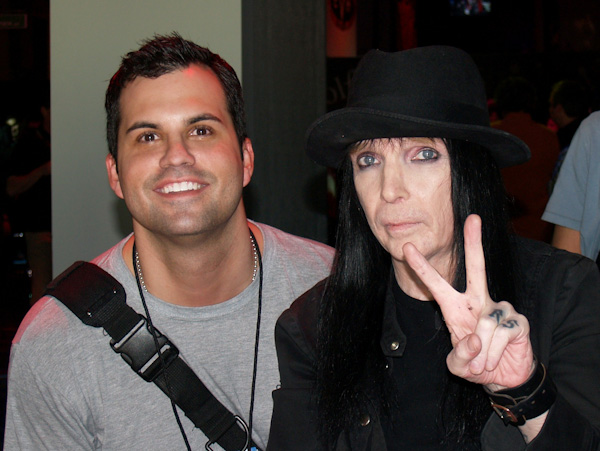
We would like to thank Heidi Metcalfe from Harper Collins for setting up the interview with Thomas. For more information on purchasing this book, please go to: Thomas Scott McKenzie.

